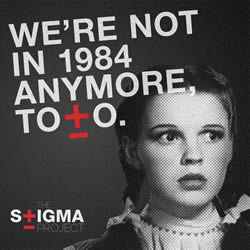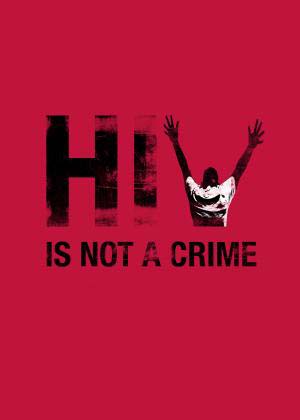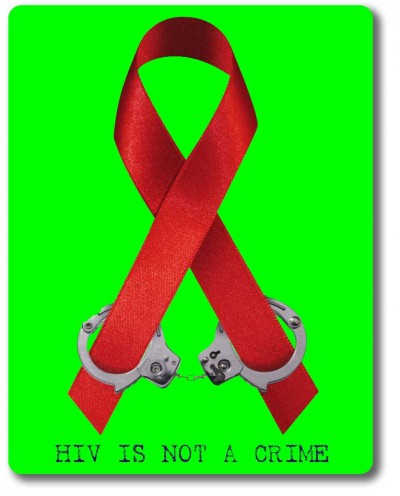
With thanks to members of SWOP-USA
Laws that criminalize HIV exposure are supposed to benefit public health, but in practice are extremely harmful to public health and to the targeted HIV-positive individuals. Sex workers are highly vulnerable to these laws, which sometimes target HIV-positive prostitution specifically. Many require forcible HIV testing, and sometimes they simply criminalize HIV but in reality are applied to sex workers more frequently than to other populations.
The criminalization of HIV-positive sex workers and mandatory post-arrest HIV testing arguably violates international human rights treaties signed by the United States. Treaties with applicable provisions include the International Covenant on Civil and Political Rights (ICCPR) and the International Convention on the Elimination of All Forms of Racial Discrimination (ICERD), specifically their provisions on privacy, rights to equality before the law, and sanctions against inciting hatred and racial bias. Recent forced HIV testing in Greece provoked outrage among international human rights organizations such as Amnesty International and Human Rights Watch. WHO/UNAIDS (World Health Organization/the Joint United Nations Programme on HIV/AIDS) made a statement opposing forced testing. It is widely accepted that best practices for HIV testing, with the best public health outcomes, involve three key principles—consent to testing, the provision of counseling before and after testing, and confidentiality of results. The imposition of felony offenses on individuals who are said to be engaging in sex work while living with HIV punishes members of already vulnerable communities. They are prosecuted even when they use condoms and engage in less risky forms of sex with their partners, sometimes even if they have disclosed their status to their partner. Information about their HIV status, sometimes accompanied by photographs, is often distributed widely by the media in their communities, placing arrestees at risk of retaliation and other abuse. This incentivizes avoiding testing and does nothing to encourage treatment or safer sex practices.

In Colorado, people are given mandatory HIV tests upon being convicted of prostitution. If they are subsequently re-arrested and convicted for prostitution or a related offense, or have had a different non-state-mandatory HIV test at some point that came back positive, they are charged with a class 5 felony. This crime is generally punishable by one to three years in prison and/or a $1,000-$100,000 fine. The applicable statute, “prostitution with knowledge of being infected with acquired immune deficiency syndrome,” includes very low risk as well as virtually zero risk activities such as masturbation and oral sex and does not distinguish between sex with and without a condom, nor are their provisions for sex with an individual with zero viral load. The law also applies to HIV positive clients—“patronizing a prostitute with knowledge of being infected with acquired immune deficiency syndrome”—but they are charged with a less serious class 6 felony.
Many states besides Colorado engage in similar witch-hunts when it comes to HIV-positive sex workers. In twenty five states, individuals arrested for, charged with, or convicted of prostitution can legally be required to undergo HIV and other STI testing. Thirty have criminal statutes based on perceived exposure to HIV, regardless of the actual risk of transmission, and thirteen states have laws that criminalize certain acts—like spitting—by people with HIV/AIDS, even though it is not possible to transmit HIV through saliva. Aside from being charged under HIV-specific criminalization statutes, people living with HIV have been charged under aggravated assault, attempted murder, and bioterrorism statutes.
William Head, an HIV positive man with a zero viral load, was performing erotic massage this past summer when he was busted for prostitution with knowledge of AIDS, a felony. He was demonized in the press, even though they believed he performed sex acts that could not possibly have transmitted HIV to anyone. He was outed as HIV-positive to the greater Denver area in the process, but thankfully he won his case: though he was performing massage without a license, it was not erotic massage. Yet the huge stigma against gay men added to the stigma against HIV-positive people combined to make the police and DA want to railroad him. What if he had been providing happy endings, though, or even oral sex? Transmission of HIV through oral sex is uncommon and generally involves sores and/or semen in the provider’s mouth—i.e. it is transmitted from the receptive partner, likely the client, to the provider, and there have only been about 40 case reports of this occurring since the beginning of the HIV epidemic, out of 70 million infections. There is no way transmission could occur in cases involving people with a zero viral load. Oral sex with condoms is even closer to a zero risk activity. Mutual masturbation is also considered more or less zero risk, especially when the person providing the handjob is the infected party. Transmission of HIV through unprotected sex of any sort is also low risk if the infected person is receiving successful ARV treatment, as Head was.
“Darren Garcia,” as the newspapers call her, while also frequently misgendering her contrary to AP Style Book and GLAAD guidelines, is a transgender woman and street-based sex worker. She is also positive for HIV, and has also been demonized by the wider Denver community as well as the press for it.
Garcia was likely practicing safer sex. Providing—not receiving—blowjobs and handjobs is common practice in the street market. Hopefully she was receiving treatment, and if she was not, that is a failure on the part of our healthcare system and of the shame and stigma that our society heaps on people who have contracted HIV. Even if none of this was true, though, the risks here tend to be far below what the general public believes them to be.

According to the Center for Disease Control (CDC), an HIV-infected person engaging in unprotected receptive vaginal or anal intercourse will transmit the virus to the penetrative partner 5 or 5.5 times per 10,000 sex acts, respectively. This risk is reduced to 2 or 2.2 times per 100,000 sex acts if the HIV-positive individual is taking antiretroviral therapy, and 2.6 or 2.8 times per 1,000,000 sex acts if antiretroviral therapy is combined with consistent condom use. In other words, the risks of contracting HIV through protective penetrative intercourse with an HIV-positive individual on HAART therapy is only slightly higher than contracting HIV via a blood transfusion in the US.
Pooled data from six studies showed that “if 1,000 serodiscordant couples in which the HIV-positive partner is on ARV therapy with an undetectable viral load had sex for one year, about one or two of the HIV-negative partners would become infected with the virus. All four of the transmissions in the six studies took place before six months had passed since the HIV-positive partner began ARVs and therefore may not have yet reached an undetectable viral load. Taking this into account, the researchers conducted another analysis excluding the data from these transmissions. In this case, the risk of transmission was also 0.0 per 100 person years.”
Additionally, HIV-positive people who practice sex work often do not have other options. They are usually dealing with entrenched poverty, are often transgender and/or otherwise marginalized in seeking employment, and suffer physical and sexual abuse at very high rates. Garcia is a transgender woman and a crack cocaine user who works the streets. Prostitution arrests, especially felony prostitution arrests that out the person as HIV-positive, and as in Garcia’s case, as transgender, further diminish any opportunities for the person outed to seek employment outside of illicit sex work. The laws make helping an HIV-positive sex worker such as Garcia with life goals and exit strategies impossible. Instead, long prison sentences followed by recidivism are the norm for sex workers like her. Garcia has been arrested for solicitation at least eight times, and for prostitution with knowledge of HIV at least three times. The consequences of any prostitution conviction are harsh, but these HIV laws greatly exacerbate the associated harm of prostitution convictions, all of which have distinct impacts on housing, immigration, custody, and employment. The result is a criminalized population that has serious difficulty leaving the profession or securing labor rights and equal treatment if they continue doing street sex work.
Thankfully, some members of the U.S. government are beginning to realize that HIV-positive people are not a public health hazard. U.S. Senator Chris Coons (D-DE) and U.S. Representatives Barbara Lee (D-CA) and Ileana Ros-Lehtinen (R-FL) have introduced the REPEAL HIV Discrimination Act in the U.S. Congress:
“It’s simply not fair that someone having been diagnosed with a chronic, treatable medical condition should automatically be subjected to a different set of criminal laws,” Senator Coons said. “A disturbing number of state and local criminal laws pertaining to individuals with HIV/AIDS are rooted not in science, but in outdated fear. They run counter to effective public health strategies, discourage HIV testing, and perpetuate unfair stigma and discrimination against people living with HIV/AIDS – people who are our friends, family, and neighbors. Rather than recognizing that HIV/AIDS is a treatable medical condition, these laws perpetuate the idea that HIV is a deadly weapon and people with HIV/AIDS are dangerous criminals. Our laws need to catch up to our science, and this bill would take an important step in that direction.”
The text of the bill can be found here. It would institute a review of local statutes that criminalize HIV or HIV exposure or transmission by the Department of Health and Human Services in order to bring them better in line with what is known scientifically about HIV transmission. It would also seem to include prostitution-specific statutes. This would be a good start toward remedying the gross miscarriages of justice the current legal situation routinely enacts.
Super frustrating to read about issues like this. There are currently 13 states that make prostitution with knowledge of HIV infection illegal. Regardless of the type of services provided.
For a more uplifting piece, though, there’s this:
http://www.thenation.com/article/just-say-n%C3%A3o
It’s this piece on Brazil from 2005 that Wikipedia paraphrased thus:
The Brazilian government turned down $40 million in U.S. anti-HIV/AIDS funding in 2005, because the U.S. government required all recipients to sign an anti-prostitution pledge. The Brazilian anti-AIDS program employs prostitutes to hand out information and free condoms; Brazil’s AIDS commissioner Pedro Chequer was quoted as saying “Sex workers are part of implementing our AIDS policy and deciding how to promote it. They are our partners. How could we ask prostitutes to take a position against themselves?”
Cheers me right up again. Gotta love a country that doesn’t decriminalize sex work and comes up with drink names like cachacha 🙂
Since this piece was published, the legal situation in Colorado has improved tremendously. It is no longer a felony and they are no longer permitted to do forcible testing.